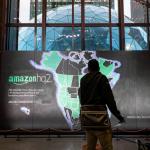This City Hall, Brought to You by Amazon

There’s rising worry that corporations are taking over America. But after reviewing a slew of the bids by cities and states wooing Amazon’s massive second headquarters, I don’t think “takeover” quite captures what’s going on.
More like “surrender.”
Last month Amazon announced it got 238 offers for its new, proposed 50,000-employee HQ2. I set out to see what’s in them, but only about 30 have been released so far under public-record acts.
Those 30, though, amply demonstrate our capitulation to corporate influence in politics. There’s a new wave, in which some City Halls seem willing to go beyond just throwing money at Amazon. They’re turning over the keys to the democracy.
Coming from the home of the largest corporate tax-break package in U.S. history, which our state gave to Boeing, I figured I was well acquainted with the dark arts of economic-incentive deals.
But still I was surprised to see the lengths to which some cities and states will go to get a piece of that high-tech glory.
Example: Chicago has offered to let Amazon pocket $1.32 billion in income taxes paid by its own workers. This is truly perverse. Called a personal income-tax diversion, the workers must still pay the full taxes, but instead of the state getting the money to use for schools, roads or whatever, Amazon would get to keep it all instead.
“The result is that workers are, in effect, paying taxes to their boss,” says a report on the practice from Good Jobs First, a think tank critical of many corporate subsidies.
Most of the HQ2 bids had more traditional sweeteners. Such as Chula Vista, California, which offered to give Amazon 85 acres of land for free (value: $100 million) and to excuse any property taxes on HQ2 for 30 years ($300 million). New Jersey remains the dollar king of the subsidy sweepstakes, having offered Amazon $7 billion to build in Newark.
But more of a bellwether to me are proposals that effectively would put Amazon inside the government.
Some are small. Boston has offered to set up an “Amazon Task Force” of city employees working on the company’s behalf. These would include a workforce coordinator, to help with Amazon’s employment needs, as well as a community- relations official to smooth over Amazon conflicts throughout Boston. (Surely Amazon can handle these things itself?)
But the most far-reaching offer is from Fresno, California. That city of half a million isn’t offering any tax breaks. Instead it has a novel plan to give Amazon special authority over how the company’s taxes are spent.
Fresno promises to funnel 85 percent of all taxes and fees generated by Amazon into a special fund. That money would be overseen by a board, half made up of Amazon officers, half from the city. They’re supposed to spend the money on housing, roads and parks in and around Amazon.
The proposal shows a park with a sign: “This park brought to you by Amazon,” with the company’s smiling arrow corporate logo.
“The community fund projects would give Amazon credit for the funding of each project,” the proposal says. “The potential negative impacts from a project would be turned into positives, giving Amazon credit for mitigating it.”
Is it even legal to give a company direct sway over civic spending like that?
When asked about it, Fresno’s economic-development director threw the public interest under the bus.
“Rather than the money disappearing into a civic black hole, Amazon would have a say on where it will go,” he told the Los Angeles Times. “Not for the fire department on the fringe of town, but to enhance their own investment in Fresno.”
You poor fools out on the fringe of town. All this time you’ve been paying your taxes, thinking it was for the broader public good. Suckers.
Seriously, we’ve got Congress slashing corporate taxes, business cash overwhelming elections and the Federal Communications Commission poised to turn control of the internet over to a few private companies. Now a single company is viewed as such a shiny prize that some seem ready to wave the white flag on the whole “for the people, by the people” experiment.
It feels like a dicey moment for the “civic black hole.“ Also known as democracy.
